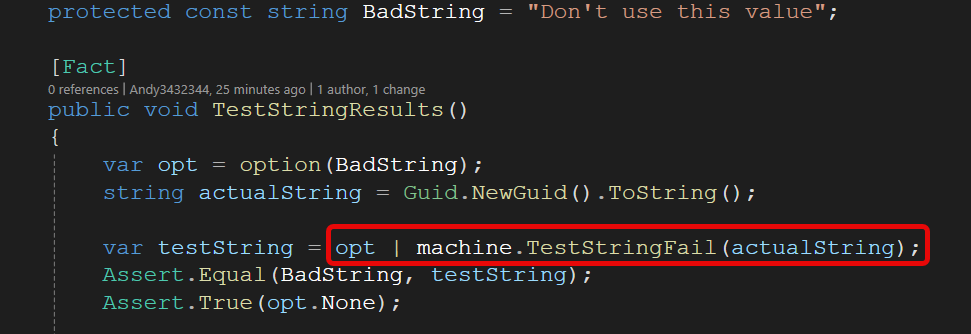this post was submitted on 10 Aug 2024
16 points (94.4% liked)
C Sharp
1532 readers
2 users here now
A community about the C# programming language
Getting started
Useful resources
- C# documentation
- C# Language Reference
- C# Programming Guide
- C# Coding Conventions
- .NET Framework Reference Source Code
IDEs and code editors
- Visual Studio (Windows/Mac)
- Rider (Windows/Mac/Linux)
- Visual Studio Code (Windows/Mac/Linux)
Tools
Rules
- Rule 1: Follow Lemmy rules
- Rule 2: Be excellent to each other, no hostility towards users for any reason
- Rule 3: No spam of tools/companies/advertisements
Related communities
founded 1 year ago
MODERATORS
you are viewing a single comment's thread
view the rest of the comments
view the rest of the comments

At least for this specific example I don't know why I wouldn't use null instead of option and ?? As it's more clear what's happening as it's standard C#
Also in your example does the function to the right of | execute always?
Nulls are famously called the billion dollar mistake, and for good reason.
Option types are the answer to that problem, because they make the optionality explicit and require one to handle it or propagate it.
That being said: as someone that does functional programming professionally, this looks kinda janky, to me. But the good news is that C# is actually adding support for discriminated unions finally (seriously, it's been waaaay too damn long): https://github.com/dotnet/csharplang/blob/18a527bcc1f0bdaf542d8b9a189c50068615b439/proposals%2FTypeUnions.md
With discriminated unions, you can finally comfortably work with Option/Result types natively.
Null pointers are one thing, C# nulls (with nullable reference types enabled) are another. They behave a lot like an Option monad with the caveat that the static analysis can technically be tricked by incorrect hints.
I very much disagree with this, Null Reference Exceptions have been a huge problem in c#. Nullable reference types are a partial fix, but the question of "how do I 'return' an error from a statically typed method" is not answered there.